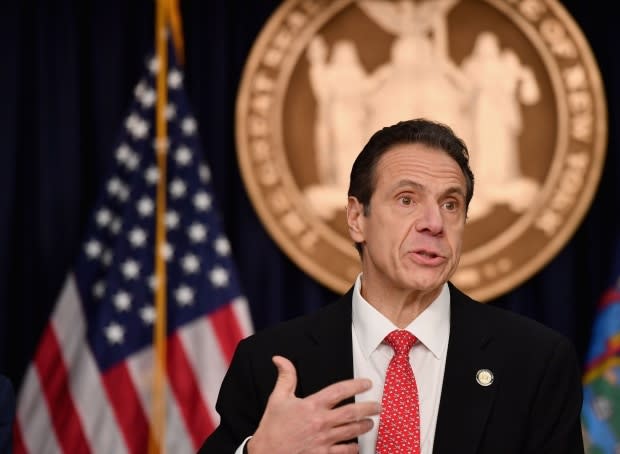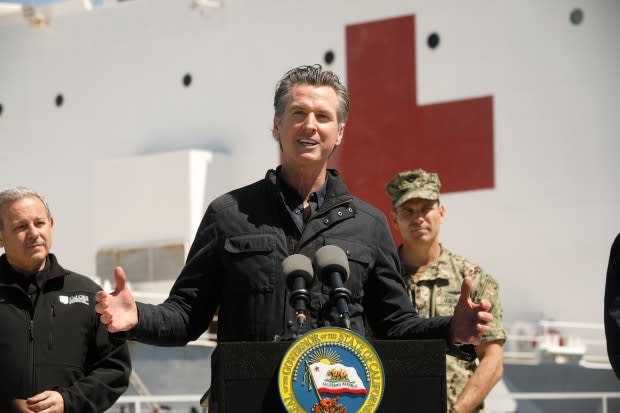In battle with governors over reopening, Trump backs down
In the battle to reopen their states, governors faced off against U.S. President Donald Trump with the law and public opinion on their side, and in the end, Trump deferred.
Trump said Thursday the governors can "call their own shots" about when to reopen businesses and schools, and released new guidelines that allow states to phase in reopening, saying some states are in better position than others and could start right away.
"Governors will be empowered to tailor an approach that meets the diverse circumstances of their own state. If they need to remain closed, we will allow them to do that," said Trump, who began the week saying he had total authority to force states to reopen.
Critics say the announcement changes little since the governors already have that authority under the Constitution.
"His directive today will be greeted with eye-rolls in governors' offices across the country, I suspect," said Democratic strategist Ian Russell.
"For a lot of people … there was never a question that they would actually be the ones in control."
Cuomo vs. Trump
After weeks of avoiding direct attacks on Trump, New York Gov. Andrew Cuomo responded to Trump's announcement saying the president had abdicated responsibility by not providing funding for increased testing or state budgets.
"Is there any funding so I can do these things that you want us to do? No. That is passing the buck without passing the bucks. Passing the buck, which is the opposite of 'The buck stops here,'" Cuomo said, referring to the phrase made famous by President Harry Truman signalling that presidents should take responsibility for the tough decisions they make.
As the governor delivered his daily briefing Friday, Trump appeared to be watching live, tweeting criticism back at Cuomo.
"Governor Cuomo should spend more time 'doing' and less time 'complaining.' Get out there and get the job done. Stop talking!'" Trump tweeted.
Cuomo responded, "If he's sitting home watching TV, maybe he should get up and go to work."
The New York governor also took umbrage with Trump saying he was giving states the authority to reopen.
"What are you going to grant me, what the constitution gave me before you were born? It's called the Tenth Amendment. I didn't need the president of the United States to tell me that I'm governor."
One step ahead
Before Trump's pivot, states were already well ahead in the discussion of what comes next. On Thursday, Ohio Gov. Mike DeWine, a Republican, said he would begin slowly reopening on May 1, when current shutdown orders expire. Cuomo, on the other hand, extended his state's stay-at-home orders until May 15.
Trump encouraged states to work together, though many had already formed alliances to co-ordinate their efforts on a regional basis. Michigan, Ohio, Wisconsin, Minnesota, Illinois, Indiana and Kentucky said they would work "in close co-ordination" to reopen the Midwest's economy.
California, Oregon and Washington said Monday they had formed a Western States Pact for a "shared vision" on how and when to open their states. The governors of New York, New Jersey, Massachusetts, Connecticut, Pennsylvania, Rhode Island and Delaware also announced a partnership Monday.
People want reassurance
Apart from having legal authority, governors have also built up the trust and credibility to reassure a nervous public, says Jai Chabria, who was a senior adviser to former Ohio governor John Kasich.
"Because [Gov. DeWine] has been transparent the entire time, he will be a credible voice on that effort," said Chabria, who notes the governor's daily briefings have become known as "Wine with DeWine."
Polls reflect the prominent place governors have taken in the public eye during the crisis. A Quinnipiac University poll last week found 74 per cent of respondents approved of their governor's response to the pandemic, compared to 46 per cent for the president.

The White House's seemingly erratic response has further contributed to the rise in governors' popularity and credibility, said law professor Dick Howard.
"The president's policies seem to change from day to day," said Howard, who teaches at the University of Virginia. "So when you look at that performance in Washington compared with a much more steady hand of at least some of the governors, then it's not surprising that the governors end up looking pretty good."
Howard says the governors' daily briefings bring to mind the "fireside chats" of President Franklin Roosevelt, which offered comfort during unsettling times in the 1930s and '40s.
"People want that kind of reassurance — and frankly, they're not getting it from the president."
Politics at play
While Trump took a more deferential tone on Thursday, it may only a matter of time before he clashes with governors again. Previous battles have included issues over everything from testing to supplies.
"Democratic governors may well feel that they will gain politically by being assertive," Howard said. "One notices that Republican governors in places like Texas and Florida are much more deferential to the president. Their political calculation is that they tend to be on the losing side if they differ with the president."
Shifting responsibility for restarting the economy to the states also shifts potential blame to governors if something goes wrong.
"Trump has demonstrated time and time again that he wants the trappings of power without the responsibility of power," said Russell, who notes Trump really only has influence over governors in Republican states.
Maryland Gov. Larry Hogan, a Republican and the current chair of the National Governors Association, has been an exception. He penned a bipartisan op-ed with Michigan's Democratic Gov. Gretchen Whitmer listing ways Washington has failed to help the states during the pandemic.

Looming fiscal crisis
There is, however, a looming threat that may use up all the political capital and goodwill governors have accumulated during the crisis and put Trump back in the spotlight. Shutting down businesses also means state tax revenue will take a massive hit.
"They have to put their thumb in the dam right now. But that is going to come gushing over and it's going to cause headaches," Chabria said.
Cuomo says his state will have a $10-$15 billion budget hole because of the pandemic and says the federal government should provide federal bailout money.
"Why don't you show as much consideration to states as you did to your big businesses and to your airlines?" Cuomo said at his Friday briefing.
Howard said the looming fiscal crunch adds to the difficult dynamic governors have with the Trump administration, which they'll need to rely on for billions in bailout money.
"All of the governors confront that quandary," he said. "Even if they're not very fond of the president, they realize there is federal aid they would like to see coming their way."


